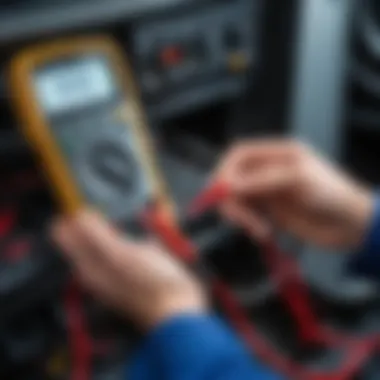Diagnosing Granta Vehicle Starting Issues Effectively


Обзор автомобиля
The Granta is a compact vehicle manufactured by AvtoVAZ, known for its affordability and functionality. It has become popular among drivers looking for a reliable means of transportation. Understanding the features and specifications of this vehicle helps in diagnosing starting issues that may arise.
Основные характеристики
The Granta offers a blend of practical features such as:
- Compact design: This makes it easy to navigate through tight urban spaces.
- Fuel efficiency: The vehicle is designed to be economical, reducing daily running costs.
- Affordability: Priced competitively, it appeals to a wide range of customers.
- Comfortable interior: Despite being compact, the Granta provides decent space for passengers and cargo.
Описание двигателей и трансмиссий
The Granta is equipped with various engine options, typically ranging from 1.6 to 1.8 liters, providing sufficient power while maintaining good fuel economy. The transmission systems generally include both manual and automatic options, which offers flexibility for different driving styles. Each type of engine and transmission has its own set of characteristics that can influence how well the vehicle starts. Regular maintenance is crucial to ensure these components function optimally.
Diagnosing starting issues in the Granta requires an understanding of these mechanical elements. The role of the battery, starter motor, and ignition system must not be overlooked, as they are key contributors to the starting process.
Prolusion to Granta Starting Problems
Starting issues in a Granta vehicle can be frustrating and often perplexing. Understanding these problems is not just about addressing an inconvenience—it's vital for ensuring the vehicle operates reliably. This section serves as an introduction to the key concepts surrounding starting problems, shedding light on mechanical failures and electrical system malfunctions. The importance of addressing these issues early cannot be overstated, as unresolved problems can lead to more significant damage and costly repairs down the line.
Overview of the Granta Model
The Granta model is known for its simplicity and efficiency, making it a popular choice among drivers looking for reliability in their daily commutes. It is designed with a user-friendly interface and supports various engine types, which can sometimes complicate starting mechanisms. Understanding the specifications and functionalities of the Granta model is essential for diagnosing its starting issues effectively. This involves gaining insight into how its different components work together, especially those directly related to the ignition and power systems.
Importance of Understanding Starting Mechanisms
Recognizing how the starting mechanism in a Granta operates can lead to more effective troubleshooting. The starting process involves several components that work synchronously, such as the battery, starter motor, alternator, and ignition system. When any part of this system fails, the entire starting process is compromised.
For vehicle owners and automotive professionals alike, a clear understanding of these mechanisms allows for quicker diagnosis and solutions to starting problems. Knowing what to look for, like unusual sounds or warning lights, can save both time and money. Moreover, being aware of how environmental factors, such as temperature and humidity, influence vehicle performance provides a comprehensive approach to diagnosing and preventing starter issues in the Granta.
Common Symptoms of a Non-Starting Granta
Understanding the common symptoms of a non-starting Granta is essential for car owners and automotive professionals. These symptoms act as indicators that something is amiss with the vehicle's starting system. Identifying these early can save time and money. Additionally, having a grasp of what these signs mean allows for better communication when seeking professional help.
No Response from the Starter
When the ignition is turned on but there is no response from the starter, it is a clear sign of an underlying issue. Often, this indicates a potential problem with the battery or the starter motor. If the battery is weak or dead, the electrical current may not be sufficient to engage the starter. This situation might also stem from faulty connections or wiring within the starting circuit.
To diagnose this, check the battery voltage using a multimeter. A healthy battery should measure about 12.6 volts when fully charged. If the voltage is low, charging or replacing the battery could be necessary. It's also wise to inspect the battery terminals for corrosion, which may inhibit the flow of electricity.
Clicking Sounds When Ignition is Engaged
Hearing a clicking sound when trying to start the Granta is another common symptom. This sound usually indicates that the starter is attempting to engage, but it fails to do so completely. This could be due to a weak battery that cannot provide enough power to turn the starter. Alternatively, it could signal a problem with the starter solenoid or the starter motor itself.
When you encounter this issue, first check the battery's charge. If the battery is functioning properly, the next step is to test the starter. A malfunctioning starter motor may need to be repaired or replaced.
Engine Cranks but Does Not Start
When the engine cranks but fails to start, the problem could lie within a variety of systems. While a functioning starter motor indicates that the battery and electrical systems are likely operational, possible fuel or ignition issues could prevent the engine from starting. This symptom generally indicates a more complex problem, requiring further investigation.
To troubleshoot, check if fuel is reaching the engine. This can be done by listening for the fuel pump's activation when the ignition is turned on. If there are sounds of fuel delivery, the next focus should be on the ignition system, checking spark plugs and ignition coils for functionality.
Dashboard Warning Lights
Dashboard warning lights can provide crucial information regarding the health of the Granta's starting system. Different lights indicate different issues; for example, a battery warning light may suggest battery problems, while a check engine light may point to concerns within the engine management system.


It is beneficial for car owners to familiarize themselves with these warning lights. An owner should not ignore these indicators as they can guide necessary maintenance or repairs. Regular checks of dashboard lights can help preemptively identify and address problems before they escalate into starting failures.
Key Mechanical Issues Affecting Start-Up
Diagnosing starting issues in the Granta involves several mechanical factors. Each of these components plays a vital role in ensuring the vehicle operates smoothly. Recognizing the key mechanical issues is crucial not only for troubleshooting but for maintaining the overall health of the vehicle. Understanding these issues can facilitate quicker and more effective repairs, ultimately saving time and money for the owner.
Battery Problems
Battery issues often represent the first line of defense in the starting process. If a vehicle won’t start, examining the battery is essential. Each battery has a lifespan, and after some years, signs of wear and tear can present themselves.
Signs of Battery Failure
One of the most evident signs of battery failure is the inability to start the engine. A weak or dead battery can lead to multiple complications. You may notice that the dashboard lights are dim, or the engine cranks slowly. These symptoms indicate that the battery cannot hold a charge effectively. This aspect is beneficial for understanding starting difficulties because recognizing battery failure allows for timely intervention. Replacing a battery when necessary can prevent further mechanical issues down the line.
Testing the Battery
Testing the battery is a straightforward yet important process for vehicle owners. Using a multimeter, you can check the battery’s voltage. A fully charged battery should read about 12.6 volts. If the reading is below 12.4 volts, there could be underlying issues. Regular testing of the battery is popular among savvy car owners as it helps to identify problems before they escalate. The unique feature here is that many auto parts stores offer free battery testing, making it an accessible preventative measure.
Replacing the Battery
When the battery shows signs of irreparable issues, replacement becomes necessary. Choosing the right battery is crucial, as a low-quality battery may not perform effectively. Look for batteries with good reviews and warranties. This unique feature ensures that you invest wisely in a component that influences many other systems in the vehicle. Though replacing a battery can seem trivial, it is one of the most impactful starting solutions for the Granta.
Alternator Functionality
The alternator is another integral part of the vehicle's electrical system. It not only charges the battery but also powers the vehicle's electrical systems while running. If the alternator fails, the battery may not receive a charge, leading to starting problems.
Importance of a Functional Alternator
A well-functioning alternator is essential to maintaining optimum performance of the Granta. If the alternator is malfunctioning, symptoms can range from dim headlights to battery warning lights lighting up on the dashboard. Recognizing the importance of this component is beneficial for troubleshooting. Understanding that the alternator helps charges the battery illustrates its role in the starting system.
Diagnosing Alternator Issues
Diagnosing alternator issues can be done using a multimeter as well. Checking the voltage output while the engine runs can reveal if the alternator works correctly. If the output is consistently below 13.8 volts, replacing the alternator should be considered. Focusing on this aspect can significantly affect the vehicle's reliability, and it is often a straightforward fix that can be done by experienced car owners or professionals.
Starter Motor Malfunction
The starter motor is responsible for initiating the engine’s crank. If this component does not function correctly, it can create significant starting issues.
Identifying Starter Problems
When trying to start the vehicle and there’s a clicking sound but no cranking, the starter motor might be to blame. Identifying starter problems often involves checking for signs of wear, loose wiring, or electrical failures. This understanding is critical because a defective starter may lead to unnecessary replacements of other components if not diagnosed properly.
Replacing the Starter Motor
If repairs are not feasible, replacing the starter motor becomes essential. A new starter motor can bring back reliable functionality. It’s prudent to choose a quality replacement part, as cheap alternatives can lead to further starting issues. The unique aspect of this procedure is that it often requires moderate mechanical experience, underscoring the benefit of seeking help from professionals if unsure.
Fuel System Issues
The fuel system also plays a crucial role in the starting process. Ensuring the proper delivery of fuel to the engine is vital for ignition.
Fuel Pump Function
The fuel pump should deliver an adequate amount of fuel to the engine. If it fails, the engine will not receive the necessary fuel to start. This aspect is significant since low fuel pressure signals can arise from an inadequate pump. Understanding this encourages proactive checks on the pump as part of regular maintenance.
Clogged Fuel Filter Signs


A clogged fuel filter can restrict fuel flow, leading to starting problems. Signs of a clogged filter may include difficulty starting the engine or a drop in performance during acceleration. Awareness of these signs allows for timely replacement, thus preventing greater issues as they evolve. Consider incorporating checks on the fuel filter during routine maintenance for better overall vehicle performance.
Electrical System Considerations
Fuses and Relays
Importance of Fuses in the Starting Circuit
Fuses play a crucial role in protecting the starting circuit of the Granta. They prevent electrical overloads that can cause damage to components. If a fuse blows, it disrupts the electrical flow, leading to starting issues. Recognizing the significance of fuses allows car owners to troubleshoot effectively. An effective check of fuses can save time and avoid unnecessary repairs. Additionally, using high-quality fuses can enhance the durability of the starting circuit, though one must be cautious during replacement to ensure the correct rating is used.
Checking Relays
Relays act as switches that help control various electrical circuits in the vehicle. Regular checking of relays is essential to ensure reliable functionality. A faulty relay can prevent the starter motor from engaging, which stops the car from starting. The importance of this is clear when diagnosing starting problems. As they can be less intuitive to diagnose, knowing how to test and replace relays ensures timely repairs. The advantage of keeping relays in good working order cannot be overstated; it increases electrical system reliability.
Ignition System Analysis
The ignition system is indispensable in the starting process. It generates the spark necessary for ignition, and any failure here can directly impact the ability of the vehicle to start. Analysis often involves examining components such as ignition coils, spark plugs, and ignition switches. Diagnosing issues in this system requires some knowledge of electrical testing equipment, making it possibly more complex for average owners. Yet, thorough understanding here will likely reduce time spent troubleshooting.
Wiring and Connections
Inspecting Wiring Harness
The wiring harness must be in good condition to ensure a proper connection between electrical components. Inspecting the wiring harness is vital in determining if electrical faults exist. Common signs of issues include frayed or melted wires, which can lead to shorts and starting failures. Timely inspection boosts the chance of identifying issues early. Avoiding extensive damage by addressing wiring problems proactively can significantly enhance reliability.
Signs of Corrosion
Corrosion can be detrimental to the electrical system and often manifests at battery terminals and connectors. Detecting signs of corrosion is essential, as this can impede the flow of electricity. Regular checks for corrosion can prevent larger issues from arising. The characteristic of corrosion is that it can sometimes be subtle but impactful. Resolving corrosion issues early helps maintain optimal electrical connections and extend the lifespan of critical components.
Tip: Always maintain a log of any repairs and inspections related to the electrical system; this aids in identifying recurring issues.
Environmental Factors Impacting Start Problems
Understanding the environmental factors that influence the starting problems of the Granta vehicle is crucial for effective diagnosis and troubleshooting. Many car owners often overlook these external elements. However, they significantly affect battery performance and overall functioning of the vehicle. By recognizing how temperature, humidity, and moisture can contribute to starting issues, owners can take preventive actions to minimize risks.
Temperature Effects on Battery Performance
Battery performance is directly affected by temperature extremes. In cold weather, chemical reactions in the battery slow down, leading to weaker power generation. As a result, when temperatures drop below approximately 32°F (0°C), you may notice reduced cranking power. In this instance, the engine may struggle to start, or worse, fail entirely. Conversely, high temperatures can cause an increase in battery fluid evaporation, which results in internal damage.
Some key signs that temperature affects the battery include:
- Slow engine cranking: This is a common symptom in cold weather when the battery is less efficient.
- Corrosion: High heat can lead to leakage and corrosion, impacting battery terminals.
To mitigate these issues, vehicle owners can consider
- Using a battery warmer in cold climates to increase performance.
- Regularly checking battery fluid levels and maintaining cleanliness around terminals.
- Parking in shaded or climate-controlled areas to help extend battery life in hotter regions.
Humidity and Moisture Considerations
Humidity plays a role in how well moisture-sensitive components of the vehicle, such as wiring and connectors, perform. High humidity can lead to condensation form which can create short circuits. When moisture accumulates on electrical connections, it can lead to failure in the ignition system or starter motor. Such failures may also occur due to the corrosion of terminals and wiring.
To combat humidity-related issues, car owners should:
- Inspect electrical connections regularly for corrosion or damage caused by moisture.
- Maintain a clean environment inside and outside the vehicle to avoid accumulation of debris that attracts moisture.
- Use electrical greases on connections to repel moisture and prevent corrosion.
"Regular preventive maintenance can save you from unexpected failures caused by environmental factors.”


By understanding these environmental factors, Granta owners will be better equipped to prioritize battery care and electrical system integrity. This approach helps maintain reliable starting performance regardless of external conditions.
Preventative Measures for Granta Owners
Preventative measures are essential for Granta owners who wish to avoid starting issues. It is far easier to prevent problems than to fix them once they occur. Through necessary actions taken during routine maintenance, vehicle longevity and reliability can be greatly improved. This section will explore two main areas: regular maintenance practices and the importance of seasonal check-ups.
Regular Maintenance Practices
Maintaining your Granta is foundational to its dependable performance. Owners should prioritize regular checks and services. Understanding the fundamental parts of your vehicle can help you stay on top of maintenance requirements.
- Oil Changes: Regular oil checks and changes are necessary. Following the manufacturer's recommendations can help avoid engine issues.
- Battery Care: Inspect the battery regularly for any signs of corrosion on the terminals. Clean connections are crucial for reliable starting.
- Fluid Levels: Ensure that all fluid levels are checked. This includes coolant, brake fluid, and transmission fluids. Correct levels help maintain overall performance.
- Tire Conditions: Inspect tires for proper tread and inflate to recommended pressures. Poor tire conditions can lead to additional strain on the starting system.
Establishing a regular maintenance routine will ensure any potential issues can be spotted before they escalate into starting problems.
Importance of Seasonal Check-Ups
Check-ups that align with seasonal changes can identify specific issues related to different weather conditions. This is especially important in regions with harsh climates, either hot or cold.
- Winter Preparations: In cold months, the battery's performance can degrade. It may be beneficial to test the battery capacity before winter sets in. Additionally, using winter-grade oil can improve engine performance in low temperatures.
- Summer Considerations: During warmer months, ensure the cooling system is functioning correctly. Overheating can lead to severe starting problems.
By performing seasonal check-ups, you can catch problems early and ensure your Granta is ready for the climate it faces.
Proper maintenance not only extends the life of the vehicle but also enhances safety and reliability on the road.
When to Seek Professional Help
Understanding when to consult a professional mechanic is an essential part of maintaining your Granta. While many starting issues can be resolved with some basic troubleshooting, there are times when the complexity of the problem outweighs the benefit of trying to fix it yourself. Recognizing these situations can save you time, money, and potential further damage to the vehicle.
It is important to seek expertise when you observe persistent starting problems despite your best efforts to diagnose them. This not only ensures that the problem is correctly identified but also allows for appropriate solutions. Let's delve into the signs that indicate you may need an expert's intervention and how to choose the right mechanic for your needs.
Signs that Indicate Expert Diagnosis
Some symptoms clearly suggest the need for a professional’s experience. If you are noticing multiple symptoms such as an engine that cranks without starting, persistent clicking sounds, or dashboard lights remaining illuminated despite troubleshooting steps, it may be time to call in a professional. Here are some specific signs:
- Recurrent Issues: If the starting problem occurs repeatedly even after troubleshooting different components, this indicates a more complex underlying issue.
- Multiple Symptoms: Experiencing a combination of issues, such as erratic behavior of dashboard lights along with starting trouble, may point towards an electrical fault.
- Strange Noises: Unusual noises during starting, such as grinding or constant clicking, usually signal that there is an issue with the starter motor or possibly with the battery connections.
- Emergency Situations: If the vehicle fails to start at an inconvenient or unsafe location, such as on a busy road or during unfavorable weather, prioritizing professional help is crucial.
Recognizing these signs can help you make an informed decision about seeking professional advice.
Choosing the Right Mechanic
Selecting an appropriate mechanic is crucial once you’ve decided to seek professional help. A competent mechanic can assure that the diagnostic process is thorough and that the issues are addressed accurately. Here are some considerations to keep in mind:
- Qualifications and Experience: Look for mechanics who are certified and have experience specifically working on Granta models or related vehicles. This knowledge can lead to quicker diagnoses and effective repairs.
- Reputation: Online reviews and recommendations from fellow car owners can be valuable in gauging the reliability and skill of a mechanic. Websites like Reddit or automotive forums often contain honest assessments of various service providers.
- Transparency in Service: Choose a mechanic who communicates clearly about the diagnosis and offers an estimate before proceeding with repairs. Understanding what you are paying for is crucial for trust.
- Comprehensive Services: Opt for a service center that provides a wide range of electrical and mechanical services. This could simplify the process if multiple aspects of the vehicle are affected.
Finding the right mechanic can relieve you of the stress associated with diagnosing automotive issues by ensuring that your Granta receives professional care.
Finale
In summary, familiarity with the starting mechanisms and the common symptoms of failure is essential. Granta owners and mechanics alike should prioritize knowledge about electrical and mechanical systems in the vehicle. Additionally, recognizing environmental factors that impact performance can't be overlooked. Such awareness allows for informed troubleshooting and timely intervention, which can save both time and money.
Summary of Key Points
- Mechanical Issues: Knowing the role of the battery, alternator, and starter motor is crucial for diagnosing starting problems. Each component has specific symptoms that reveal its condition.
- Electrical Considerations: Fuses, relays, and wiring play significant roles in ensuring the vehicle starts. Regular checks can prevent sudden failures.
- Environmental Factors: Temperature and humidity can affect how well a vehicle starts. Granta owners should take these into account during maintenance practices.
- Preventative Measures: Regular maintenance can help avoid common starting issues. Seasonal check-ups are advisable.
- Professional Help: It is important to know when to seek expert diagnosis. Choosing the right mechanic enhances the vehicle's reliability.
Final Thoughts on Granta Maintenance
Maintaining a Granta is not just about fixing issues when they appear. It is about cultivating an understanding of the vehicle’s operation. Knowledge is power when it comes to car ownership. Adopting a proactive approach to maintenance can enhance the overall performance of the vehicle.
A clear strategy for regular checks, recognizing warning signs early, and utilizing proper resources go a long way. The benefits do not only include a more reliable vehicle but also an improved driving experience. Engaging with professionals for complex issues improves diagnostic efficiency and supports vehicle longevity. It is advisable for all Granta enthusiasts and mechanics to pursue this comprehensive understanding of their vehicle.
"An ounce of prevention is worth a pound of cure."
By implementing these practices, owners can ensure their Granta remains dependable and safe on the road.







